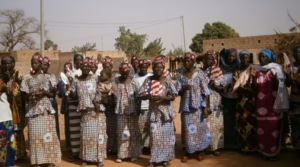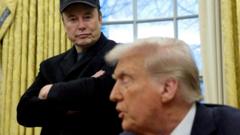The Department of Government Efficiency (DOGE) recently unveiled a $51 million reduction in funding allocated to the U.S. African Development Foundation, focusing on perceived wasteful expenditures in marketing and agricultural initiatives overseas. In a statement posted on X (formerly Twitter), DOGE highlighted various grants that have raised eyebrows regarding their necessity and effectiveness. These included:
Cuts in U.S. Funding Target Marketing and Agricultural Projects in Africa

Cuts in U.S. Funding Target Marketing and Agricultural Projects in Africa
The U.S. Department of Government Efficiency announces significant cuts to the U.S. African Development Foundation, citing concerns over wasteful spending at a time of domestic economic challenges.
- $229,296 designated for marketing organic shea butter in Burkina Faso
- $246,217 allocated for mango drying facilities in the Ivory Coast
- $239,738 aimed at promoting pineapple juice in Benin
- $99,566 provided to boost yogurt production in Uganda
- $84,059 for a spa and wellness business incubator in Nigeria
- $50,000 to train farmers in Senegal in dragon fruit cultivation
- $48,406 for a WhatsApp marketing chatbot in Kenya
In response to these cuts, the African Development Foundation has defended its initiatives by asserting that they contribute positively to economic growth and local development in these regions. However, DOGE contends that taxpayer money should not be used to support niche markets abroad while American citizens grapple with rising inflation and economic instability.
The funding reallocation reflects a broader strategy spearheaded by Elon Musk during the Trump administration, aiming to eliminate $1 trillion in federal waste. This initiative seeks to streamline government spending and prioritize essential national needs over what some officials view as extravagant or non-essential projects. As discussions about fiscal responsibility intensify, this decision marks a significant pivot in how American development aid may be distributed moving forward.
- $246,217 allocated for mango drying facilities in the Ivory Coast
- $239,738 aimed at promoting pineapple juice in Benin
- $99,566 provided to boost yogurt production in Uganda
- $84,059 for a spa and wellness business incubator in Nigeria
- $50,000 to train farmers in Senegal in dragon fruit cultivation
- $48,406 for a WhatsApp marketing chatbot in Kenya
In response to these cuts, the African Development Foundation has defended its initiatives by asserting that they contribute positively to economic growth and local development in these regions. However, DOGE contends that taxpayer money should not be used to support niche markets abroad while American citizens grapple with rising inflation and economic instability.
The funding reallocation reflects a broader strategy spearheaded by Elon Musk during the Trump administration, aiming to eliminate $1 trillion in federal waste. This initiative seeks to streamline government spending and prioritize essential national needs over what some officials view as extravagant or non-essential projects. As discussions about fiscal responsibility intensify, this decision marks a significant pivot in how American development aid may be distributed moving forward.


















